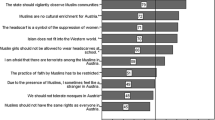Abstract
Whilst the homogenizing descriptor ‘gay’ is often used in a singular sense to refer to ‘the gay community,’ research has increasingly recognized that individuals within gay communities are as diverse as they are within the broader community. Importantly, recognition of this diversity requires an acknowledgement of the fact that, just as in the broader community, discrimination occurs within gay communities. The present study sought to examine the degree to which racism occurs within gay men’s online communities (in the form of anti-Asian sentiment expressed in the profiles of a small number of the 60,082 White Australian gay men living in five major Australian states whose profiles were listed on the website gaydar.com.au during October 2010), the forms that such racism takes, and whether any White gay men resisted such racism. The findings report on a thematic and subsequent rhetorical analysis of the profiles of the sub-sample of 403 White gay men who expressed anti-Asian sentiment. Such sentiment, it was found, was expressed in four distinct ways: 1) the construction of racism as ‘personal preference,’ 2) the construction of Asian gay men as not ‘real men,’ 3) the construction of Asian gay men as a ‘type,’ and 4) the assumption that saying ‘sorry’ renders anti-Asian sentiment somehow acceptable. Whilst the numbers of White gay men expressing anti-Asian sentiment were relatively small, it is suggested that the potential impact of anti-Asian sentiment upon Asian gay men who view such profiles may be considerable, and thus that this phenomenon requires ongoing examination.
Similar content being viewed by others
References
Augoustinos, M., Tuffin, K., & Every, D. (2005). New racism, meritocracy and individualism: Constraining affirmative action in education. Discourse and Society, 16, 315–339. doi:10.1177/0957926505051168.
Boldero, J. (2004). Understanding cultural differences in safe-sex behaviour: The experience of gay Asian Australians. In D. W. Riggs & G. A. Walker (Eds.), Out in the antipodes: Australian and New Zealand perspectives on gay and lesbian issues in psychology (pp. 267–292). Perth: Brightfire.
Braun, V., & Clarke, V. (2006). Using thematic analysis in psychology. Qualitative Research in Psychology, 3, 77–101. doi:10.1191/1478088706qp063oa.
Caluya, G. (2006). The (gay) scene of racism: Face, shame and gay Asian males. ACRAWSA e-journal, 2(2). Retrieved from http://www.acrawsa.org.au/ejournal.
Campbell, J. E. (2004). Getting it on online: Cyberspace, gay male sexuality, and embodied identity. New York: Haworth.
Clarke, V., Ellis, S. E., Peel, E., & Riggs, D. W. (2010). Lesbian, gay, bisexual, trans, and queer psychology: An introduction. Cambridge: Cambridge University Press.
Cowlishaw, G. (1999). Rednecks, eggheads, and blackfellas: Racial power and intimacy in north Australia. Sydney: Allen and Unwin.
Crenshaw, K. M. (1991). Mapping the margins: Intersectionality, identity politics, and violence against women of color. Stanford Law Review, 43, 1241–1299.
Drummond, M. (2005). Asian gay men’s bodies. Journal of Men’s Studies, 13, 291–300. doi:10.3149/jms.1303.291.
Fraser, V. (2009). Online bodies and sexual subjectivities: In whose image? In B. Baird & D. W. Riggs (Eds.), The racial politics of bodies, nations and knowledges (pp. 116–132). Cambridge: Cambridge Scholars Press.
Han, A. (2006) ‘I think you’re the smartest race I’ve ever met’: Racialised economies of gay desire. ACRAWSA e-journal, 2(2). Retrieved from http://www.acrawsa.org.au/ejournal.
Hopkins, N., Reicher, S., & Levine, M. (1997). On the parallels between social cognition and the ‘new racism’. British Journal of Social Psychology, 36, 305–329. doi:10.1111/j.2044-8309.1997.tb01134.x.
Light, B., Fletcher, G., & Adam, A. (2008). Gay men, gaydar and the commodification of difference. Information Technology and People, 21, 300–314. doi:10.1108/09593840810896046.
Mowlabocus, S. (2010). Gaydar culture: Gay men, technology and embodiment in the digital age. Surrey: Ashgate.
Payne, R. (2007). Gay scene, queer grid. Queer space: Centres and peripheries conference proceedings. Retrieved from http://www.dab.uts.edu.au/conferences/queer_space/proceedings/.
Phua, V. C. (2007). Contesting and maintaining hegemonic masculinities: Gay Asian American men in mate selection. Sex Roles, 57, 909–918. doi:10.1007/s11199-007-9318-x.
Purdie-Vaughns, V., & Eibach, R. P. (2008). Intersectional invisibility: The distinctive advantages and disadvantages of multiple subordinate-group identities. Sex Roles, 59, 377–391. doi:10.1007/s11199-008-9424-4.
Raj, S. (2011). Grindring bodies: Racial and affective economies of online queer desire. Critical Race and Whiteness Studies, 7, 55–67.
Rapley, M. (1998). ‘Just an ordinary Australian’: Self-categorisation and the discursive construction of facticity in ‘new racist’ political rhetoric. British Journal of Social Psychology, 37, 325–344. doi:10.1111/j.2044-8309.1998.tb01175.x.
Rapley, M. (2001). ‘How to do X without doing Y’: Accomplishing discrimination without ‘being racist’—‘doing equity’. In M. Augoustinos & K. J. Reynolds (Eds.), Understanding prejudice, racism, and social conflict (pp. 231–250). London: Sage.
Richards, G. (1997). ‘Race’, racism and psychology: Towards a reflexive history. New York: Routledge.
Ridge, D., Hee, A., & Minichiello, V. (1999). ‘Asian’ men on the scene: Challenges to ‘gay community’. In P. Jackson & G. Sullivan (Eds.), Multicultural queer: Australian narratives (pp. 43–68). New York: Harrington Park.
Riggs, D. W. (2007). Recognising race in LGBT psychology: Privilege, power & complicity. In V. Clarke & E. Peel (Eds.), Out in psychology: Lesbian, gay, bisexual and transgender perspectives (pp. 59–76). London: Wiley.
Riggs, D. W., & Augoustinos, M. (2005). The psychic life of colonial power: Racialised subjectivities, bodies and methods. Journal of Community and Applied Social Psychology, 16, 445–467. doi:10.1002/casp.838.
Riggs, D. W., & Choi, P. Y. L. (2006). Heterosexism, racism and psychology: Challenging or colluding with privilege? The Psychologist, 19, 288–291.
Turkle, S. (1995). Life on the screen: Identity in the age of the internet. New York: Simon & Schuster.
Warner, L. R. (2008). A best practices guide to intersectional approaches in psychological research. Sex Roles, 59, 454–463. doi:10.1007/s11199-008-9504-5.
Author information
Authors and Affiliations
Corresponding author
Rights and permissions
About this article
Cite this article
Riggs, D.W. Anti-Asian Sentiment Amongst a Sample of White Australian Men on Gaydar. Sex Roles 68, 768–778 (2013). https://doi.org/10.1007/s11199-012-0119-5
Published:
Issue Date:
DOI: https://doi.org/10.1007/s11199-012-0119-5




